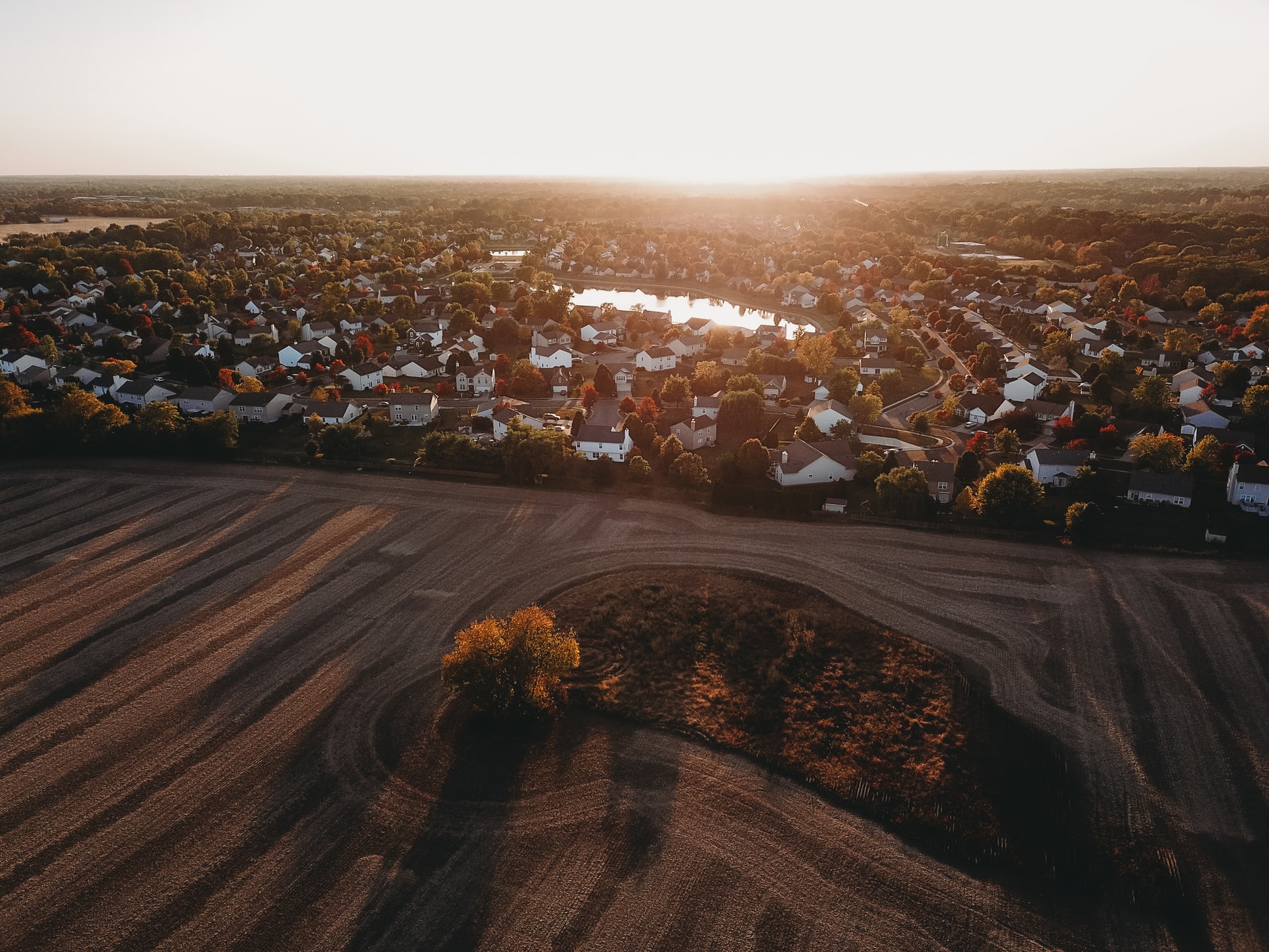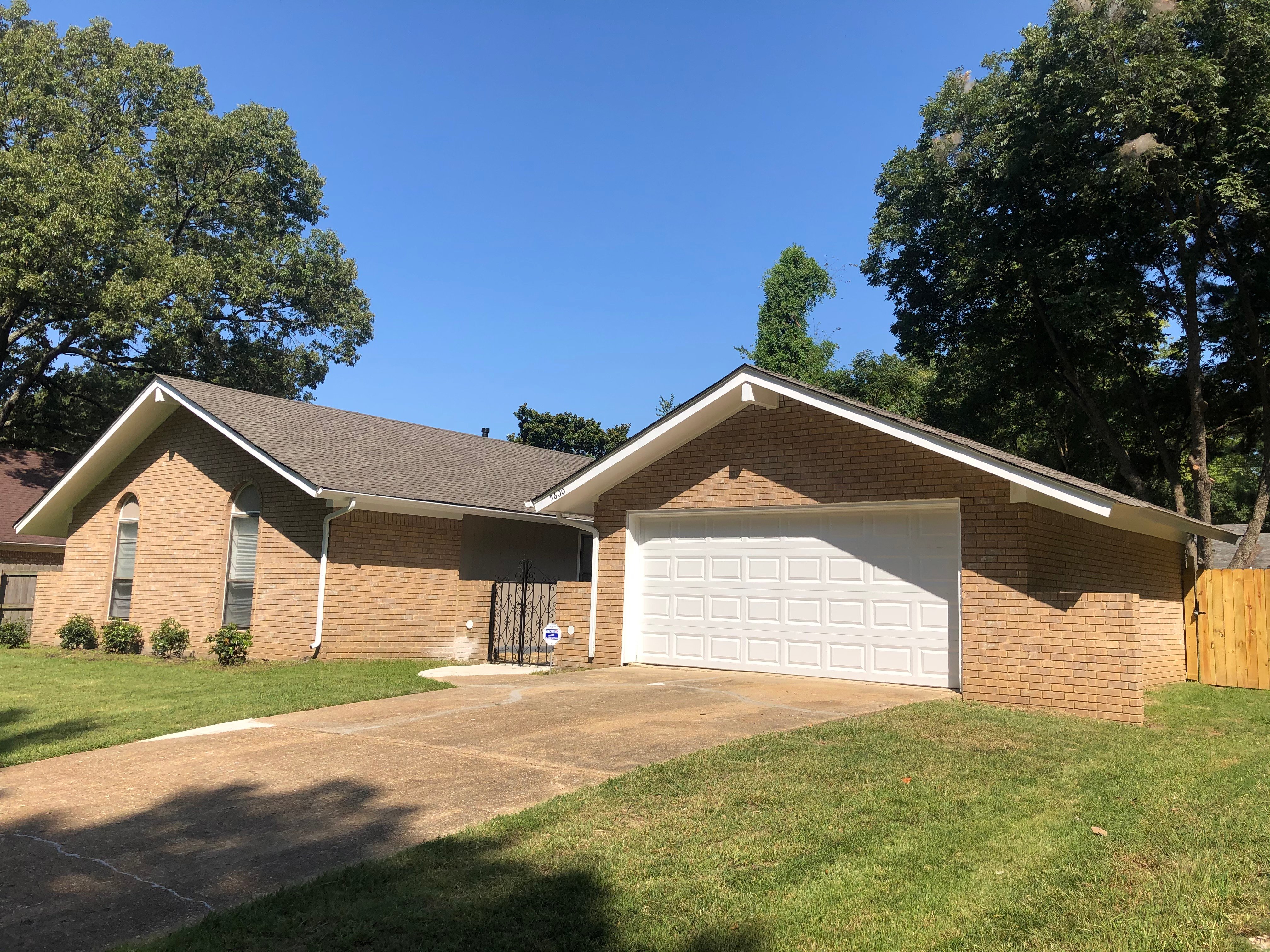2020 has been a wild, busy year — especially at REI Nation. One of the exciting things to come out of the year, however, has been the expansion of the opportunities offered to our investors. Just over eighteen years ago, we started our family-owned turnkey real estate company in our hometown, Memphis. Today, we have single-family rentals in ten markets and counting!
- Memphis, TN
- Dallas, TX
- Houston, TX
- St. Louis, MO
- Oklahoma City, OK
- Tulsa, OK
- Little Rock, AR
- San Antonio, TX (NEW)
- Birmingham, AL (NEW)
- Huntsville, AL (NEW)
- ...with more on the way!
When we dive into a new investment market, you know to expect the same level of service and quality we demonstrate in our hometown. As we expand into these new markets, we want to properly introduce investors to each one.
This is what you need to know about Huntsville, Alabama, its real estate market, and investing in the area!
Introducing Huntsville, Alabama
Huntsville, also known as “Rocket City” is located in the north-central Appalachian region of Alabama. Founded in 1805, Huntsville is now the fourth most populous city in Alabama with a city population of 194,057 (2016) and a statistical metropolitan population of 444,752 (2015). Some 1.5 million people live within a 50-mile radius of the city.
Huntsville, like many early Southern cities, grew economically on an industry of agriculture and cotton. During the 20th century, however, Huntsville grew to include textile and munitions factories. Today, it is most known for its space, defense, and technology sectors — lending it the name “Rocket City” for NASA’s Marshall Space Flight Center. It is also home to the United States Army Aviation and Missile Command at Redstone Arsenal.
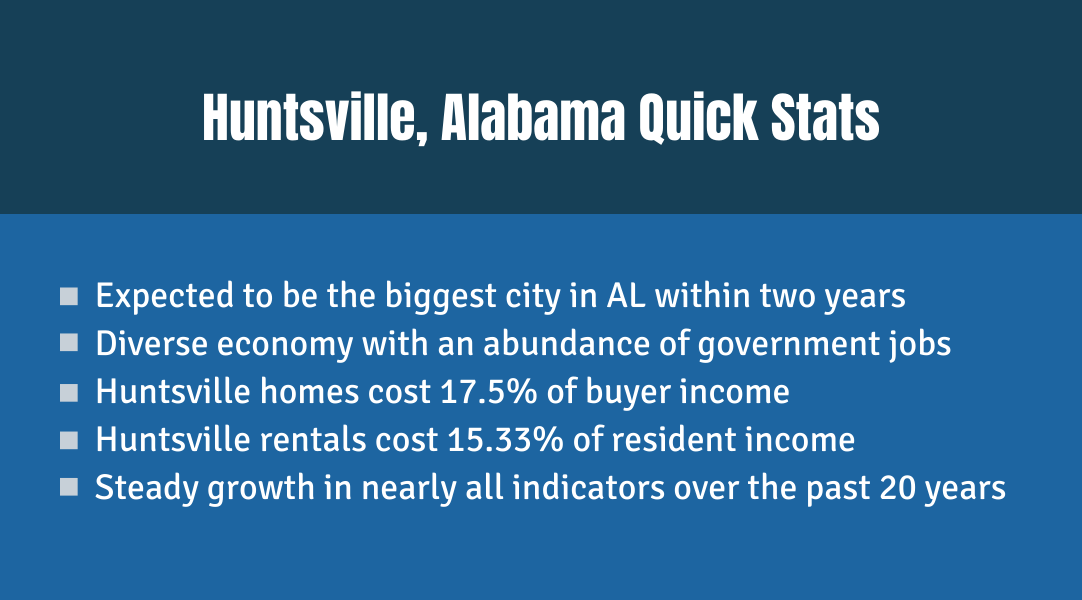
Key Qualities Driving Huntsville Market Health
The Economic Backbone of Huntsville
While most people would not expect aerospace and defense to be the specialty in a north Alabama city, that is Huntsville’s reality. We already mentioned NASA’s Marshall Space Flight Center and the U.S. Army Aviation and Missile Command centers, but they are only two of the major employers in the city. Here you’ll find over 300 aerospace, defense, and government contractors in addition to the many, many other companies in the sector. Many of these contractors specialize in IT and engineering. Federal contracts are common. Redstone Arsenal (the U.S. government) is the top employer in Huntsville with some 37,000 employees in the region.
NASA comes in third place with 6,500 employees, exceeded by the Huntsville Hospital with 9,352 employees.
Ultimately, Huntsville is a city with strong aerospace, engineering, and defense sectors. Supporting these industries in major ways are information technology, bioscience, advanced manufacturing, and healthcare sectors. Retail also plays a valuable role in Huntsville.
The strength of Huntsville’s economic backbone is clearly demonstrated in the statistics. In September 2019, Huntsville boasted an unemployment rate of just 2.8 percent (compared to the national rate of 3.7 percent at the time). Though unemployment rose throughout 2020 as a result of the COVID-19 pandemic, the rate was back down to 3.1 percent in Huntsville as of November 2020. That cuts the national rate of 6.7 percent by more than half.
Quality of Living
Wage Growth
Not only does Huntsville stand out from the rest in terms of unemployment rates, but in wages as well.
We find that Huntsville is home to significantly more earners with an annual salary of $75k - 200k+ than the rest of the state of Alabama. 40 percent of the population in the Huntsville metro earns in this range, whereas only 29.6 percent of all Alabama residents fall into this category.
The 2018 median annual income in Huntsville was $53,840 — compared to Alabama’s $48,864 median and the overall U.S. median of $61,937. Between 2017 and 2018, income grew by 3.69 percent.
Job Growth
Job growth hit 3.6 percent between 2018 and 2019, showing a trend that leads experts to predict future job growth of 40 percent. Of course, COVID-19 presented significant challenges in terms of job growth and employment. Despite this, the Huntsville area has continued to prove itself to be enormously resilient to a challenging, unprecedented year.
Despite an 8.3 percent drop in employment between March and April 2020, Huntsville remained well ahead of national statistics. Experts expect the economic recovery to take two years and three years for the GDP and employments rates to return to pre-pandemic levels, respectively.
In the earlier stages of the pandemic, roughly March through June, Huntsville saw a year-over-year difference of 7.5 percent in employment — compared to the national drop of 13 percent.
Throughout the years, from 2000 to 2020, we see that, by and large, Huntsville experienced employment growth twice that of the United States on the whole.
City Amenities
During the COVID-19 pandemic, we have come to appreciate and prioritize outdoor spaces. Huntsville, AL, is not only home to a warmer, more pleasant climate, but it home to many city amenities and services that promote outdoor recreation. In addition to nature preserves and sustainability initiatives, Huntsville is home to numerous public parks, greenways, and trails. Huntsville, like many southern markets, sees significant advantages over other markets in terms of attractive climates, outdoor space, and population density.
Then, of course, there are business incentives. Naturally, the economy plays a major role in the health of the real estate market. Huntsville provides various incentives and abatements to attract a growing, diverse economy. Given its success in employment and wage growth, it is safe to say these incentives are doing the trick!
Population Growth
As always, real estate is influenced by two major factors in any given market: the economy and the population. The latest U.S. Census demonstrates a not-so-surprising reality: Huntsville is on its way to becoming the largest city in Alabama. They have had a population growth of several thousand each year. Between 2010 and 2019, the population jumped by 20,000. That tops the growth in other major Alabama cities.
Those who know the area attribute Huntsville’s steady population growth to a few key factors: good jobs, good schools, a clean community, and beautiful countryside.
The Huntsville, AL Real Estate Market
Huntsville very clearly has a solid foundation as a real estate market. With its steady population growth and a diverse but specialized economy, it only attracts more real estate demand with each passing year. If you intend to invest in the Huntsville real estate market, however, you want to know specific real estate statistics along with the rest of the city’s economy and demographic context.
Homeownership & Sales Statistics
What makes for a healthy real estate market? There are many factors we could name, but ultimately, two are at the heart of long-term health: stability and affordability. Huntsville fits the bill. Studies show that Huntsville boasts the healthiest real estate market in all of Alabama. SmartAsset gave the city an 88.41 rating on the Healthiest Markets Index, which is based on four factors: affordability, stability, fluidity, and risk of loss.
On their list, Huntsville ranked 26th in the nation.
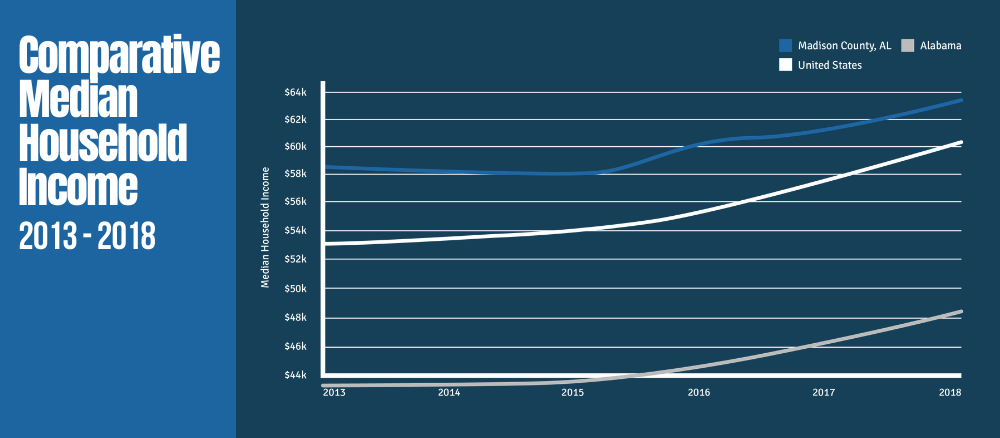
Even though Huntsville is a more affluent (and pricey) city than most other Alabama markets, homes only cost an average of 17.2 percent of household income. This is well within the margins of affordability.
Huntsville was also included in the U.S. News & World Report’s list of best places to live in 2020. High-paying jobs combined with a low cost of living and a highly educated population contributed to its ranking, among other factors.
Home Sales
Huntsville has seen accelerating real estate demand for several years now. It seems as though the COVID-19 market boom only furthered this ongoing trend! Between January and November 2020, Huntsville saw a total of 8,223 home sales. That’s an average of 748 sales per month, with higher sales occurring in months June through October, topping out at 929 in a single month.
When we look through the numbers, we see a long-standing trend of steady and increasing home sales in Huntsville. 2010 marked the bottom of Huntsville’s recent home sales at an average of 365 each month. In the decade since this rate has more than doubled. December 2020 saw 482 homes sold — a 15 percent year-over-year increase. Year-over-year, according to the Culverhouse College of Business, demand was up 21 percent in Huntsville’s Madison county in November 2020.
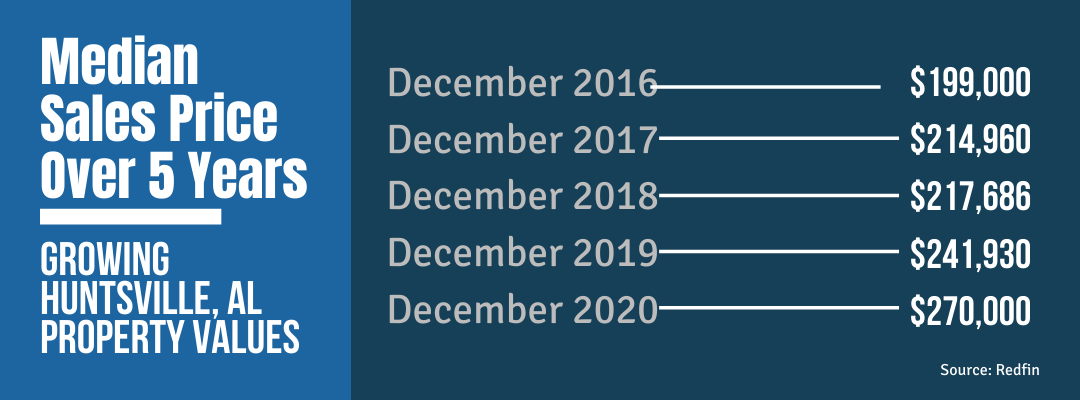
In a year where the health of the real estate market was questioned early on, this is a strong indicator of things to come — namely, increased demand for Huntsville real estate.
Inventory
Sales alone do not tell us a full picture of market demand. We must compare these numbers with the number of properties listed on the market. Unlike other markets in the nation, Huntsville did not experience significant inventory shrink in Spring 2020. In fact, inventory grew, peaking at 1,186 units in April. Throughout the year, the Huntsville market has maintained anywhere between 1 and 1.8 months of supply without significant change in the number of properties listed.
Month’s supply is indicative of the relationship between supply and demand in real estate. The fewer months (or days) of supply demonstrates stronger market demand, while more time on the market (more days of supply) indicates lower demand. Typically speaking, four to five months supply is average. A lower number tells us that there are more buyers than sellers and thus, there is more activity and competition within the market.
In December 2020, Huntsville homes saw a median of 44 days on the market according to Redfin. That’s down nearly 12 percent from the same time last year. At the same time, Redfin designates the market as “somewhat competitive.” Multiple offers are fairly common, as are homes sold above list price. However, the majority of homes sell for list price within just under two months.
Home Values
Though Huntsville is an affordable market by many other standards in the nation, it is not as affordable as it once was. According to Redfin, the median sales price in Huntsville was $270,000 in December 2020. Just four years ago, the median sales price was $199,000. 30.2 percent of homes are sold above list price (up 23.3% YOY).
This is more affordable compared to the national median — $335,519 in 2020 compared to $254,093 in 2016.
There’s no doubt that the Huntsville market is appreciating. Twenty years ago, the median home price in Huntsville was a paltry $98,000. By 2010, the median was $168,000. Demand — and thus, home values — are on the rise. It’s important to note, however, that this growth has been, above all things, stable. Again, when we look at the numbers, we see market resilience in this data alone. Huntsville median home prices barely flinched throughout the Great Recession. With few exceptions, the trends in Huntsville have been steady or upward for the past twenty years. All indicators point to this trend continuing in the future, particularly when we consider the bright economic outlook for the metro area.
Rental Properties in Huntsville
45 percent of Huntsville’s population rent their homes, outpacing the 32 percent Alabama state share of rental residents. The vast majority of properties in Huntsville are single-family homes (64%) with three-to-four bedroom homes being the norm. Rental residents had a median move-in year of 2015, where homeowners moved in at a median of 2006.
For our purposes, this points toward longer rental periods (thus, resident retention), as the median number of rental residents have been renting their homes for a median of five years.
Huntsville also experienced lower vacancy rates (at 4.49%) than that of Alabama (9.69%) and the United States (5.97%) as a whole in 2019. This has not always been the case, but vacancy rates in Huntsville have sharply dropped over the past three years.
But what about the cost of renting?
The Cost of Renting
There are two areas that we look at when considering the cost of renting in any market. For the most part, we see numbers specifically related to or including multifamily housing. While our area of expertise is single-family rentals, these numbers can still be valuable.
For example, the rent prices for multifamily units in Huntsville have been steadily on the rise. In fact, studies show that they have one of the fastest-growing rates in the nation. While this statistic might not relate to our specific properties, it does indicate rental trends that are valuable. With the growing Huntsville population and tight home inventory, rentals are in demand.
At the same time, single-family units are more plentiful (and desirable) in Huntsville. This demonstrates the prime opportunity to invest in Huntsville SFRs.
But what about the cost?
Obviously, multifamily properties do not rent for the same numbers as SFRs — they have a higher monthly rent payment and retain tenants for longer periods. With that said, an advantage in terms of resident retention can be seen in the median rent cost.
While in downtown Huntsville rent costs can easily hit $1,200, the median rent is much lower at $858 and an average of $866. This is higher than Alabama as a whole but lower than the United States median and average. This is a 9% year-over-year price increase.
Rent takes an average of just 15.33% percent of resident income — compared to 18% in Alabama and 20% nationwide. This indicates a level of affordability that is encouraging to buy-and-hold investors.
Now, these numbers are not indicative of our specific investment properties. We have to make that clear. However, knowing that the market is relatively affordable both in terms of homeownership and renting means that the cost of living is lower. This incentivizes longer-term resident stays and lower turnover.
Investing in Huntsville, AL Real Estate
Huntsville provides so many of the key indicators that make for a desirable investment market. Not only have we seen steady property appreciation, but the numbers overall have experienced an upward trajectory for the better part of the last twenty years. Even throughout the Great Recession, we see a market that was growing and remarkably resilient.
That hasn’t changed. With reliable government employment playing a major role in the region and economic growth besides, investors can expect a steadily growing economic base, low unemployment, and low risk of an economy-based real estate downturn.
To sum up, these are the top indicators that investors should take note of when looking to invest in Huntsville, Alabama:
- Job Growth & Security — Government employers, high-skill career opportunities, and business incentives have been driving steady economic and job growth in Huntsville. Even though unemployment spiked due to COVID-19, rates here fare much better than other cities in the nation. Job growth is one of the most important indicators when evaluating the health of a market, and Huntsville demonstrates that growth.
- Population Growth — Population brings rental demand. Between job opportunities, the cost of living, and the quality of life in Huntsville, it’s no surprise that its metropolitan area is expected to be the most populous in Alabama in just a few years.
- Affordability — Even though housing costs here are higher than in the rest of Alabama, a more affluent community means that these increased costs only take a moderate percentage of income, both in terms of buying property and homeownership. Of course, the prices here are still affordable relative to other similar markets in the United States. In a nation suffering an affordability crisis, Huntsville provides reprieve for owners and rental residents. For the investor, this points to decreased turnover and longer-term residents — both of which bolster your bottom line.
Tackling Huntsville's Biggest Investor Challenges
Huntsville, along with many other southern markets, provide key opportunities for real estate investors in 2021 and beyond. With all of the indicators of a healthy real estate market and favorable qualities for buyers and rental residents, Huntsville is already making a name for itself in real estate. In a post-COVID world, we’re seeing priorities shifting to favor affordability, square footage, outdoor spaces, and favorable climates. Huntsville fits the bill.
Perhaps the biggest issue for would-be investors to contend with is the lack of inventory combined with buyer demand. With homes barely staying on the market for a month, the windows of opportunity in Huntsville seem to close quickly.
That’s where REI Nation comes in.
Navigating a new investment market can be challenging, particularly when it’s difficult to buy a property in the first place. REI Nation provides turnkey properties and premier management services (and much, much more!) for buy-and-hold investors. We set our sights on excellence and attention to detail.
When you partner with REI Nation you get...
- Your best match — Real estate investors don’t have to settle for just any property. In a highly competitive market, it can be tempting to settle. REI Nation means that investors don’t have to. That’s because we get to know your needs, wants, and specifications so that we match investors with properties that accomplish their financial goals.
- More than a property — With REI Nation, you aren’t just buying an investment property: you’re building a relationship. Between our advisors, property management teams, and other top-tier real estate professionals, investing with REI Nation gives every investor access to a wealth of knowledge and experience to make their investment portfolio a successful and worry-free experience.
- Tools to build a world-class portfolio — With our investment markets and experience growing every day, you can rest assured that your properties are in good hands. Our management and renovations teams ensure that no matter which REI Nation market you invest in, you get the same diligence and dedication.
Now is the time to take advantage of the opportunity before you.
If you’re looking to invest in Huntsville, Alabama real estate, look no further than REI Nation. We have done our due diligence in ensuring that every market we target and every property we buy is positioned to grow the success of your passive real estate portfolio.
Ready to get started? Take the first step today.










